The
Long
Path
Home
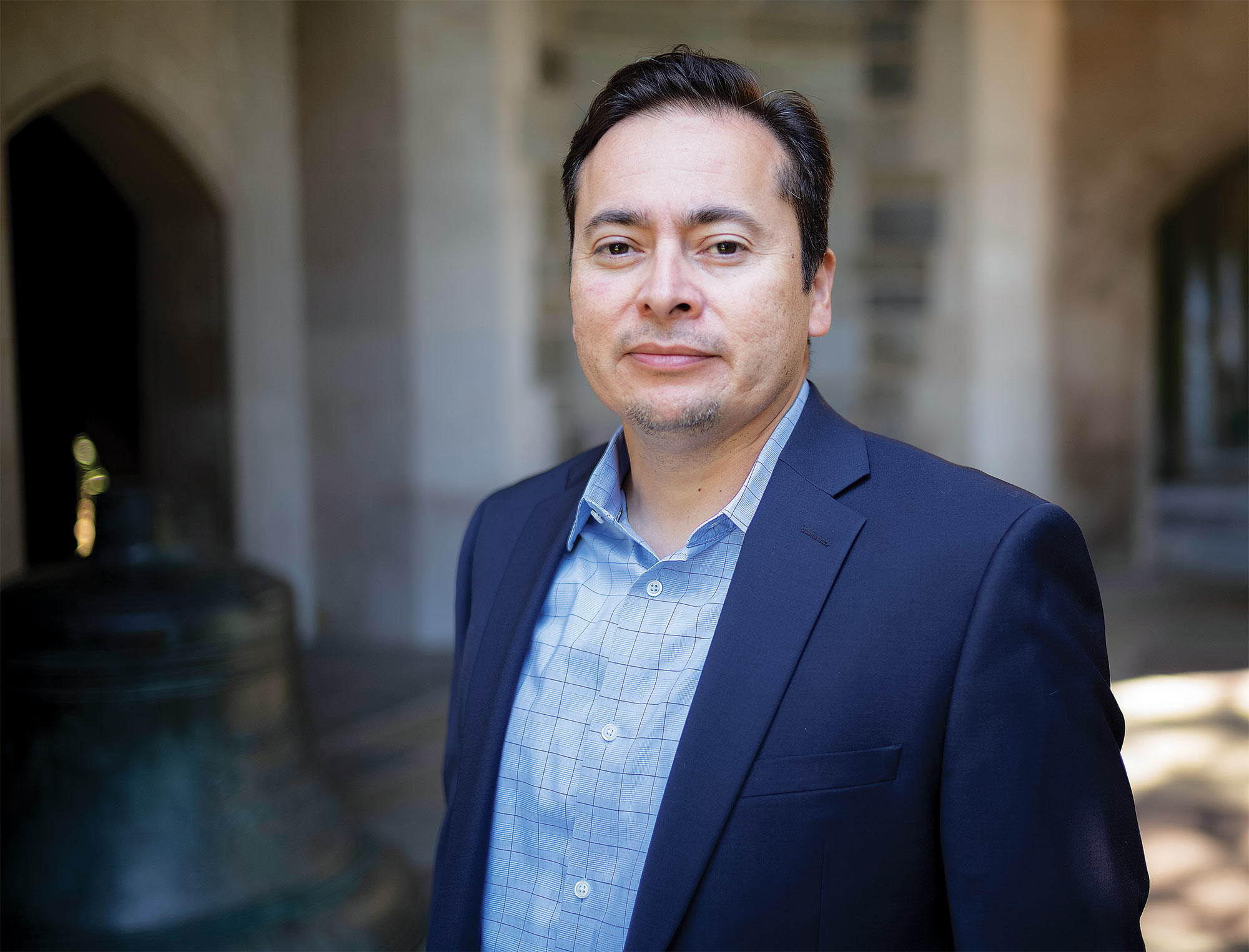
uring Steven Larín ’97’s childhood, El Salvador filled the news headlines. Civil war. Fight to stop communism. What he heard watching the news, however, differed from the talk at home.
“There are people at the other end of those stories,” Larín’s parents reminded him. “Families trying to just live their lives.”
As the family gathered around the dinner table during the 1980s, they spoke of friends who’d disappeared or been killed. Today, the human stories are the focus of Larín’s lifelong work with immigrants and refugees. Larín is deputy director of Nationalities Service Center, a Philadelphia-based nonprofit celebrating its 100th anniversary. As an attorney specializing in asylum cases and immigrant youth, he has worked directly with immigrant families for 20 years.
Larín’s parents, both Salvadoran, fled the growing violence in their country, arriving in the U.S. in the 1970s with his brother, then 2. Larín was born in Los Angeles. His father found jobs as a carpenter and factory worker in the aerospace industry. His mother took assembly-line jobs.
They faced hardship — and sometimes mistreatment — but thrived with new opportunities and support from extended family.
By the time he reached high school, Larín knew he wanted to be an attorney to help immigrant families.
“You should pick a highly ranked school that meets 100% of financial need,” Larín’s guidance counselor said, while handing him a Swarthmore brochure that showcased a pretty campus, filled with trees. “Many people do school visits,” says Larín, but for him, “it was based on the brochure.”
“I couldn’t do that to my family,” Larín says. Instead, he enrolled in Los Angeles Valley College. After a year and a half of community college and realizing there was something he needed to complete back East, Larín re-contacted Swarthmore, where he was welcomed back.
“I didn’t speak up before,” he says. “I didn’t talk to the financial aid office or dean. I was shocked by how easy it was to come back.”
When Larín returned to campus in 1994, he joined HOLA, the Latino student organization. California was not far from his mind. The state’s Proposition 187 was threatening to cut off public schooling and health care for undocumented immigrants. Larín alerted fellow students to the issues with Prop 187.
Soon, student groups focused on civil liberties and homelessness grew interested. Together, they created the Coalition Against Xenophobia, which became a leader for organizing Prop 187 protests nationwide.
“The people who inspired me were the students,” says Larín, who went on to earn his law degree from Loyola Law School in Los Angeles. “We all came together. That’s how it happens at Swarthmore.”
One exceptionally inspiring student was Elizabeth Green ’97, who joined Larín in his activist work. “We’ve been married for 15 years now,” he says. The dual-attorney couple live in Swarthmore.
“The children I’m working with look like my own children.”
“Terrible, terrible things happened to that family,” says Larín. “And on top of that, there’s the impact and devastation of separation. Our focus is keeping families together.”
Larín sees the big picture when it comes to reasons for immigration. Take the case of Guillermo. “He fled because a gang had taken over the neighborhood where he lives,” says Larín. “Two big gangs there are 18th Street and MS-13. Those two gangs have origins in the streets of L.A.”
As Larín explains, the U.S. deported large numbers of undocumented young men from California. These youths introduced U.S. gang culture to many places in Central America.
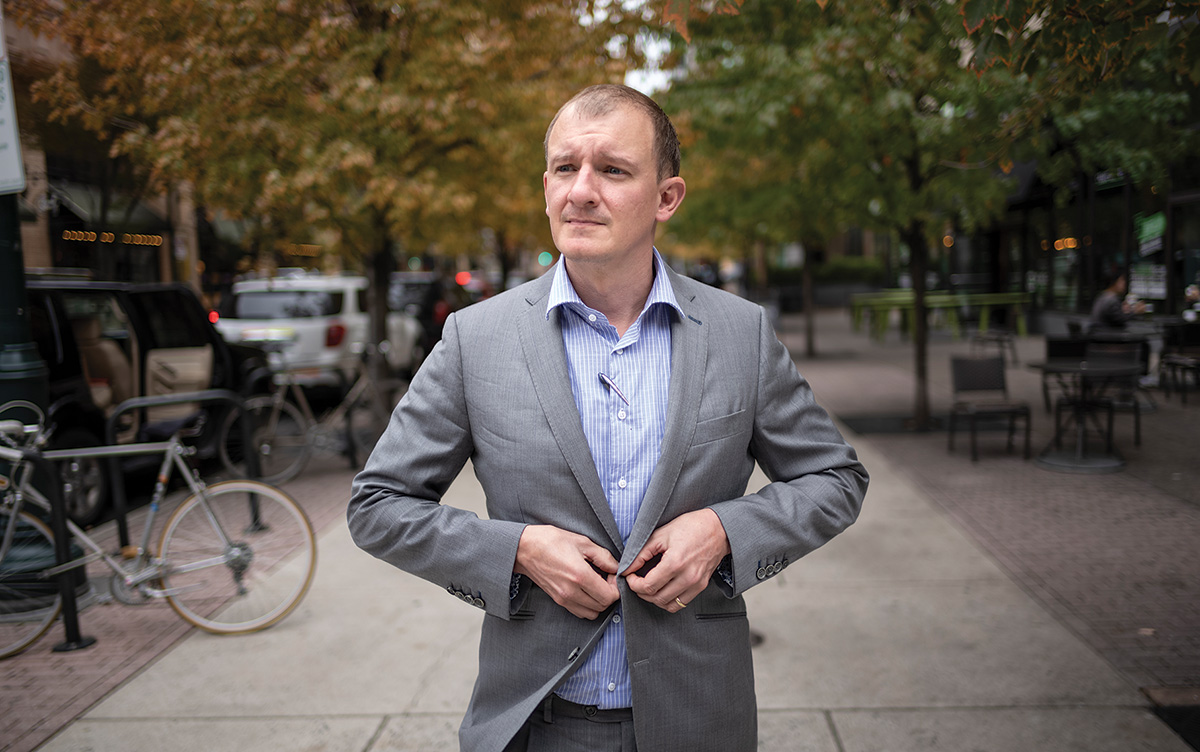
grounded in global politics
The two colleagues had many of the same professors and credit Swarthmore for its thorough grounding in global politics. Eaton also draws on his Quaker heritage.
“I grew up in a Quaker, U.N. family,” he says. His mother worked for the United Nations High Commissioner for Refugees as a protection officer. “We lived in Pakistan at the time. She took me to a refugee camp on the Pakistan border when I was 9 years old.” Those early experiences made a deep impression. “I was very much aware that people are forced to move, and where they move to is not always a very receptive place.”
Swarthmore was a natural fit for Eaton. His father was a Hicksite Quaker and a Swarthmore alumnus, and the College nurtured his growing interest in humanitarian work. “The College attracts people interested in social justice,” he says.
Eaton’s specialty in asylum and refugee law is tough work, and not all of his clients’ asylum cases are granted.
“You lose a lot,” he says. “People get deported. Families get separated.” But Eaton believes everyone who seeks asylum deserves a chance to be heard. What’s more, U.S. law requires it. He disapproves of the recent Biden administration response to Haitians seeking asylum at the U.S. border. “They are breaking the law when they deport these people,” he says, “because there is a right to apply for asylum if you’re in U.S. territory. Full stop.”
Eaton doesn’t worry about what has been labeled a “border crisis,” calling it largely a political construction. Given the nation’s size and wealth, he says, the U.S. can absorb large numbers of immigrants. “We could have just let all those people in,” says Eaton. “We can take it.” Besides, he says, most asylum seekers don’t reach U.S. borders. “The vast majority of people who flee trouble end up in the country next door. They never make it to the United States.”
For those who do come to the U.S., Eaton believes everyone deserves a fair hearing under law. A 2019 Pennsylvania State University study found that 77% of people in Pennsylvania detention centers are deported without counsel. He advocates for public defenders for immigrants. Immigration law is convoluted, he says, and his clients are often survivors of torture. “They fled here. Now they need protection.”
Eaton is not surprised to be working with so many Swarthmoreans, including student interns and Emiliano Rodriguez ’04, a union organizer with Unite Here.
“Swarthmore graduates go into nonprofits and change-making,” Eaton says. Many days he finds himself in meetings with fellow alumni. “It’s me and Steven and Emiliano,” he says, all trying to “move the ball in a more just direction.”
The Nationalities Services Center has been at the heart of this work for a century.
NSC’s original mission was to help women learn English and gain naturalized citizenship. Clients were mostly Polish, Greek, German, or Armenian. The 1960s brought Cubans and Hungarians fleeing revolution, then many refugees from Southeast Asia. Today, NSC is a unique, one-stop hub for all low-income immigrants and refugees, serving more than 5,000 clients from 100 countries in 2020. New arrivals can find legal services, English-language classes, health care, job counseling, translators, and interpreters.
Larín notes the similarities between the sudden influx of Vietnamese refugees in 1975 and the mass arrival of Afghan refugees today. “There’s been a tremendous outpouring of support,” Larín says of the 28,000 Afghan evacuees who have entered the U.S. through the Philadelphia airport. “Employers offering work, people offering temporary housing, others just wanting to welcome and greet them at the airport.”
“We consider ourselves an anti-poverty organization in addition to an immigrants’ rights organization,” he adds. “The issues that impact immigrants impact everybody in our community.”
“Organizations like the Nationalities Service Center offer crucial aid to newly settled immigrant and refugee communities in the Philadelphia area and help uphold our reputation as the City of Brotherly Love,” says Visiting Assistant Professor of Political Science Osman Balkan.
Welcoming immigrants is simply the right thing to do — for humanitarian reasons, and for very real economic benefit, Larín says. “The focus now is trying to change the narrative around immigration,” he says. Immigration brings young workers to revitalize cities. Immigrants buy houses, pay taxes, and start businesses at a rate 80% higher than non-immigrants, according to a study from the MIT Sloan School of Management. Many essential workers during the COVID-19 pandemic — from health care to food delivery — were immigrants. “They worked hard during this time to keep food in our stores and on our tables,” Larín notes.
He hopes for two things: lawful status for millions of undocumented people and an end to criminal treatment and detention centers. Despite daunting challenges, Larín imbues his daily work with heartfelt optimism. His team is solid. Jonah Eaton ’02 directs NSC’s legal services. Vivian Echeverría Quiroga, a onetime client, serves on the board while pursuing a nursing degree.
“To see the tremendous joy when things work out well,” says Larín, “to see that story repeated over and over — we’re just there for a moment in a person’s life.”
The full impact of living in the U.S. as undocumented immigrants didn’t hit until later. Aguilar and his mother moved to the Bronx in New York City and shared housing with an immigrant family from China. “Six of us slept in the one-bedroom apartment,” says Aguilar. His mother found work as a seamstress in a garment factory.
The job involved long hours and little pay, but it was the only work she could find. She was a single mom, and deaf in one ear and nearly deaf in the other. As a girl in Costa Rica, she’d had no access to sign language or hearing aids. “Because of that, she had a third-grade education,” says Aguilar. “She was functionally illiterate.” He is amazed by his mother’s courage.
His mother left for work early, so at age 8, Aguilar was boarding the city bus to school on his own, knowing little English. After school he waited for her at the local public library, which closed at 7 p.m. “In retrospect, it was frightening,” says Aguilar. “Mom’s [job] was frequently raided by the immigration police. Had they caught her, I would never have been picked up after school.” Aguilar learned English and soon became a baseball-playing, American kid.
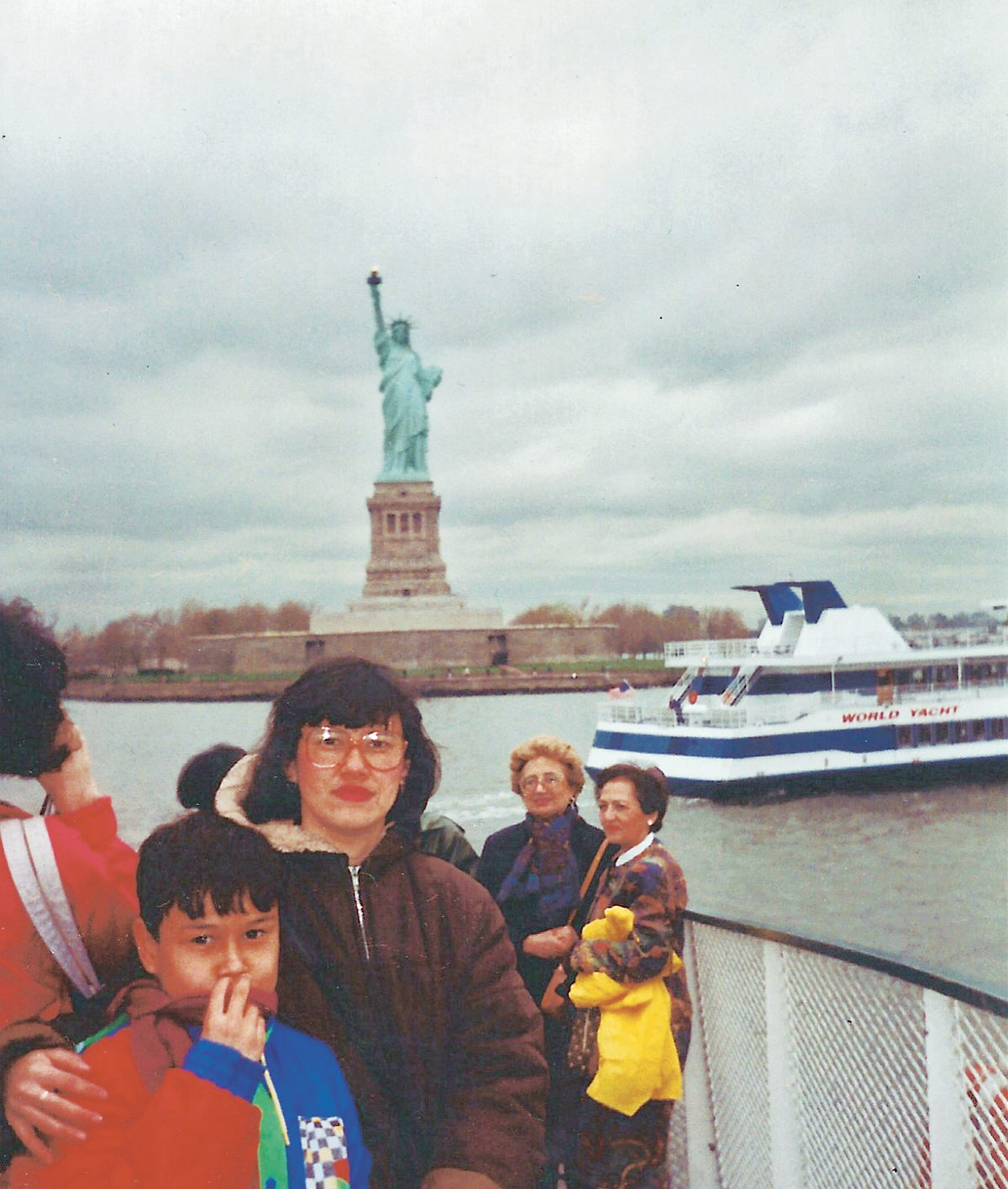
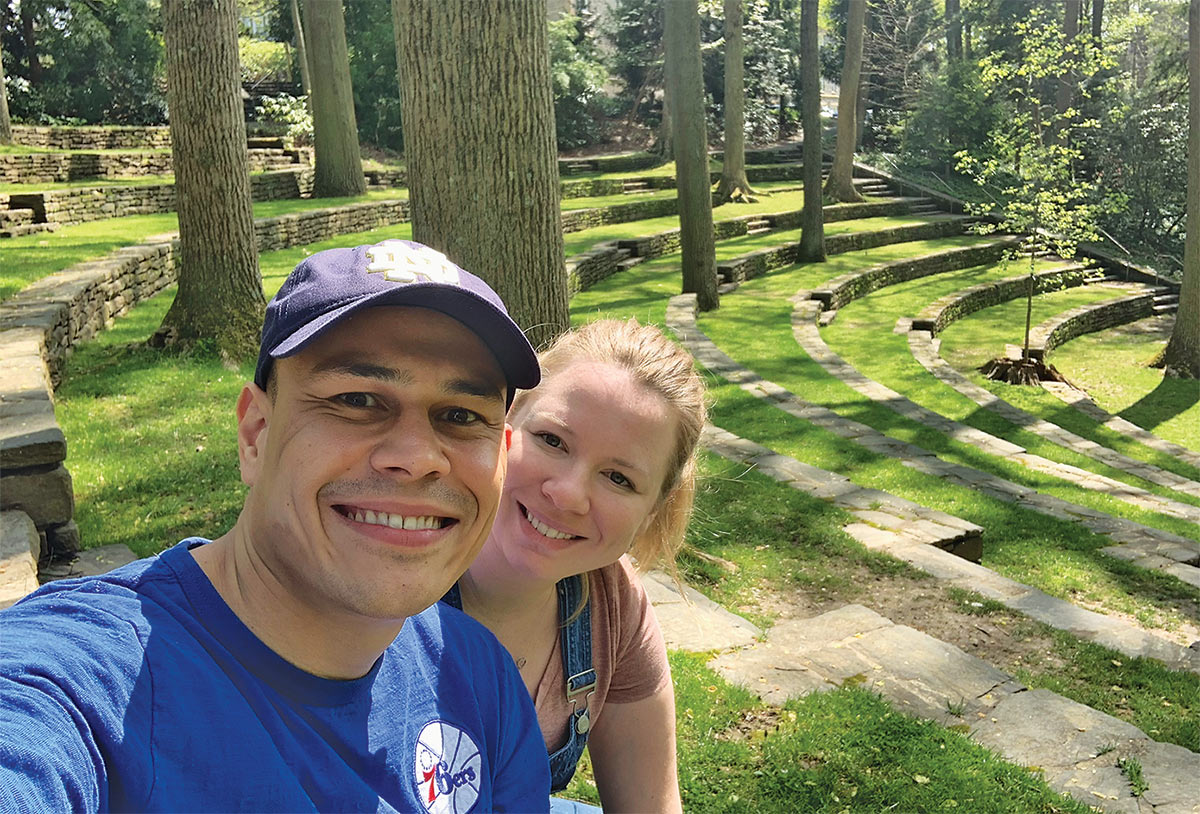
But things got tough in junior high. His school was riddled with violence, and Aguilar kept a straight-C profile to stay safe. His mother warned him to stay out of trouble.
“If you get in a fight, you’ll get kicked out of the country,” she told him, explaining that the consequences for his friends would be different. Luckily, Student Sponsors Partners, a nonprofit program for at-risk youth, steered Aguilar to a new school. Thanks to his sponsor and mentor, Aguilar started attending St. Agnes Boys High School, an all-boys Catholic school in Manhattan. “Then my grades blossomed, once I was in a safe environment,” says Aguilar.
His mother remarried a U.S. citizen and then applied for legal status for her son. His application for residency was denied because the family’s annual income failed to meet U.S. immigration income requirements. Aguilar was told to deport in 90 days. He was only 16 years old.
“I was on the cusp of being deported without my mom,” he says. At the time he was only a high school junior. “I cried to anyone who would listen.” Teachers and counselors were sympathetic, “but it was my baseball coach who offered up a solution,” he says. His coach introduced him to his father, a retired judge. They convinced a law firm to take his case pro bono and halted the deportation orders.
A Plea for Education and Empathy
Lourdes Rosado ’85, president and general counsel of LatinoJustice PRLDEF (Puerto Rican Legal Defense & Education Fund), says her own eyes were opened in Professor Ken Sharpe’s Latin American seminar, when she learned about the role the U.S. played in authoritarian regimes and weak democracies.
Rosado has spent decades fighting for social justice on a variety of fronts — from litigation and policy advocacy to community education and engagement. “It’s a very challenging time to be representing the Latino population of this country,” she says. “As the daughter of a Puerto Rican man and a Cuban woman, I feel fortunate to be doing this work.”
Rosado was chief of the Civil Rights Bureau at the New York State Attorney General’s Office when President Donald Trump enacted the Muslim travel ban in 2017. She and her colleagues leaped into action to combat this and other items, including the rescission of DACA, on his anti-immigration agenda.
“Although the Supreme Court case was a partial win,” she says, “Congress was still unable to create a pathway to citizenship.”
Though she breathed a sigh of relief when Trump was defeated, “we’re seeing threats from other areas, including state governors. And there’s still no pathway to citizenship. I’m baffled by the lack of empathy — especially by parents.”
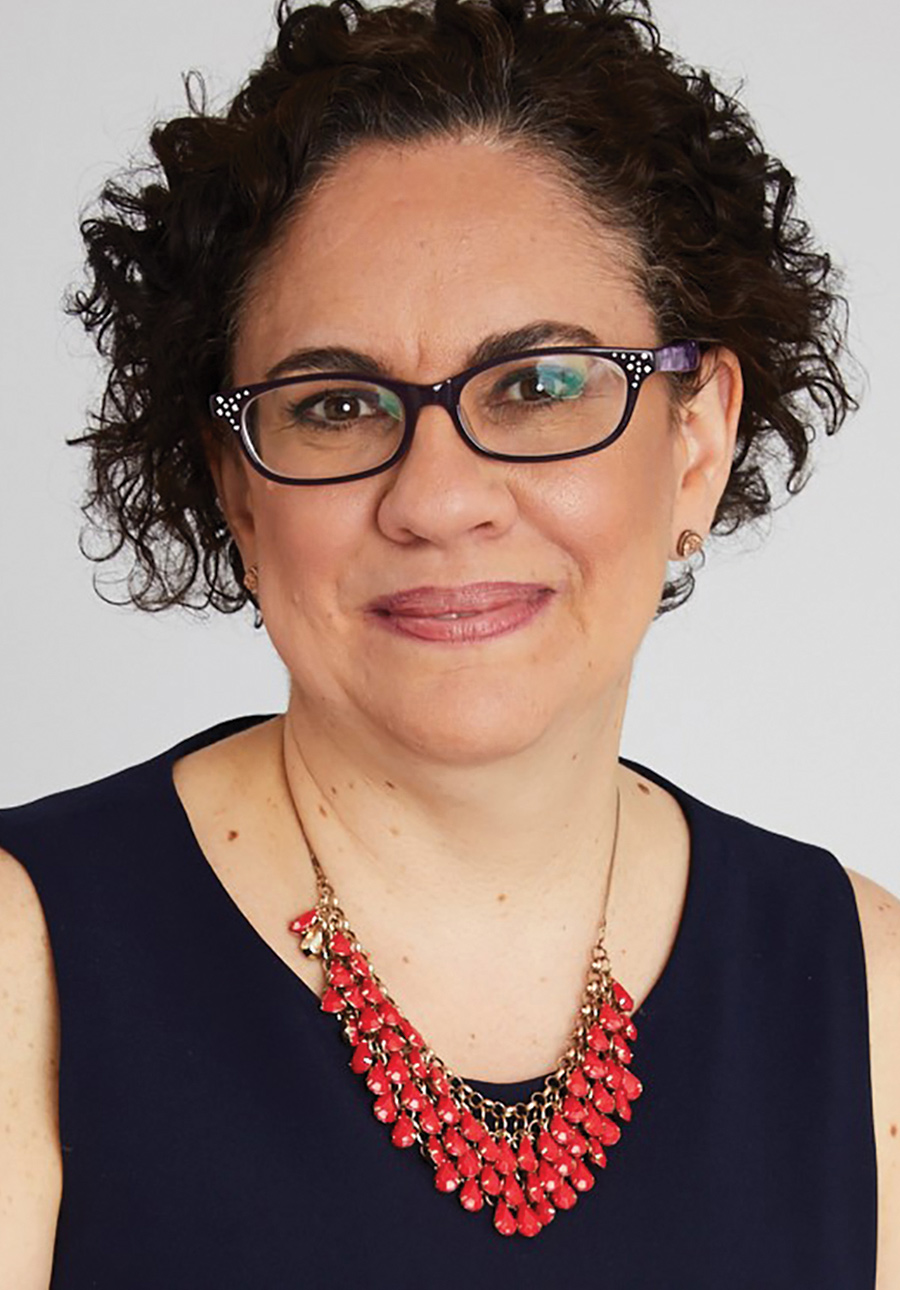
Rosado is proud of her organization’s work in assisting Latinx workers who were excluded from federal aid to apply to a New York state-created fund.
— Lourdes Rosado ’85
“That was a very powerful moment,” Rosado says. “It’s only through that kind of pressure that change is going to come.”
Rosado, who was serving on Swarthmore’s Board of Managers when the vote was taken, is also proud that the College declared itself to be a sanctuary campus.
As in most struggles for justice, it’s not just about institutions. Swarthmoreans everywhere can bring the light of education and empathy to their communities.
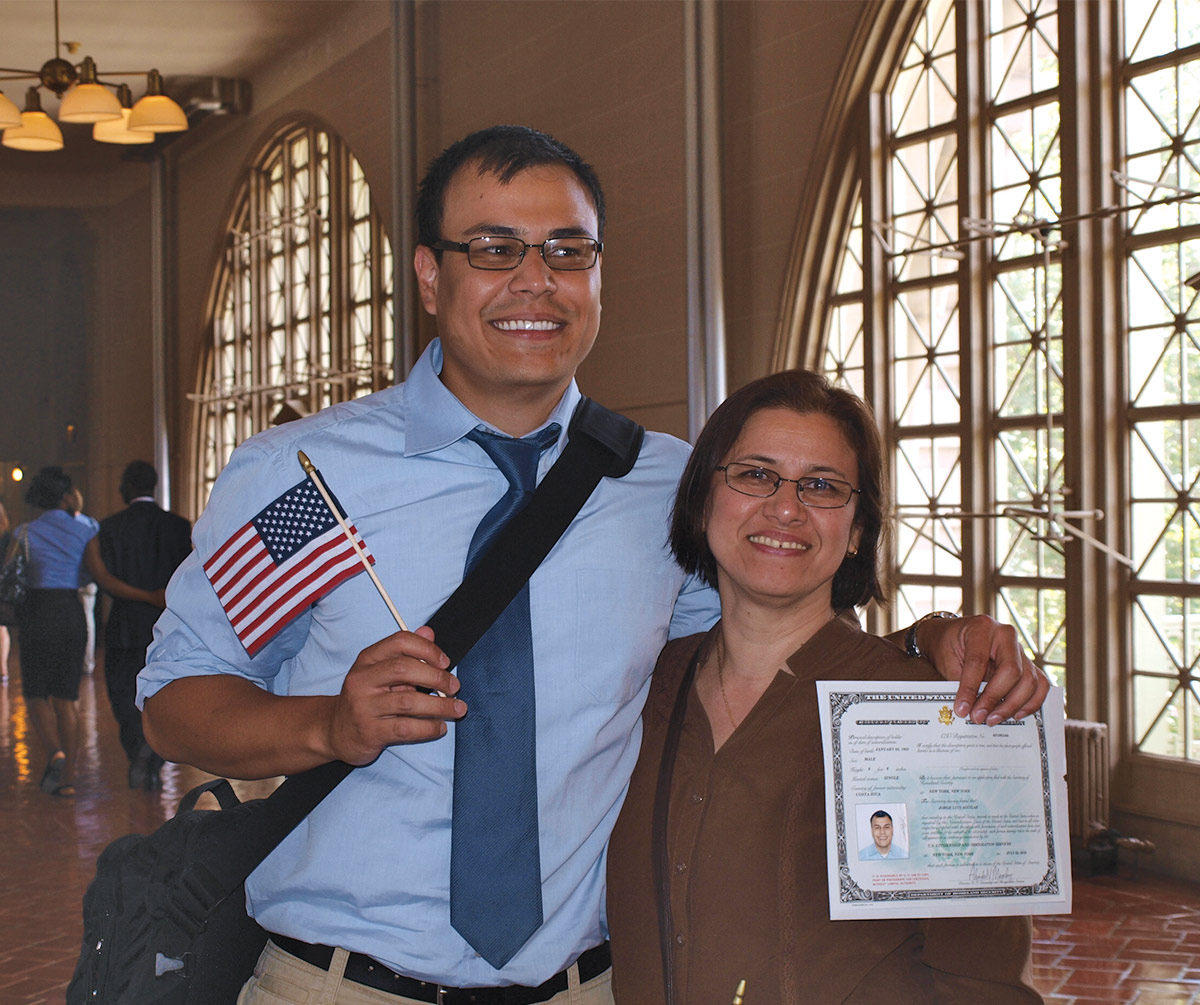
He met people from different backgrounds, played varsity sports, and served as class president. Still, it wasn’t easy.
“I struggled at Swarthmore because I never took an AP class and we didn’t speak English at home,” he says.
Amy Cheng Vollmer, the Isaac H. Clothier Jr. Professor of Biology, became Aguilar’s mentor, a relationship he credits with helping him survive the rigorous academics.
Vollmer suggested he work as a research assistant before attempting graduate school. He did, taking night classes on the side.
By the time Aguilar graduated from the Albert Einstein College of Medicine with an M.D. in medicine and a Ph.D. in microbiology, he had his citizenship papers.
Today, Aguilar is a child psychiatrist. “I practice in the Bronx,” he says. “My patient population is almost entirely Black, Brown, and poor.” Psychiatry is still predominantly a white field, and Aguilar says it’s important to recruit providers who can relate to and fully understand their patients’ circumstances.
Mental health providers are in sky-high demand, especially for kids, due to the pandemic and national unrest. That stress is causing pathological anxiety and depression, says Aguilar: “These things don’t go unwitnessed by kids.”
According to a study by the Centers for Disease Control and Prevention, mental health-related emergency room visits have increased 31% since the pandemic began, and suicide attempts by girls has increased 51%.
Aguilar worries poor families have less access and longer waiting times for mental health care.
No one benefits when immigrants struggle unnecessarily. Immigrant kids are “just as American as the other kids,” he says, and welcoming immigrants — the way Swarthmore did — is the right thing to do.